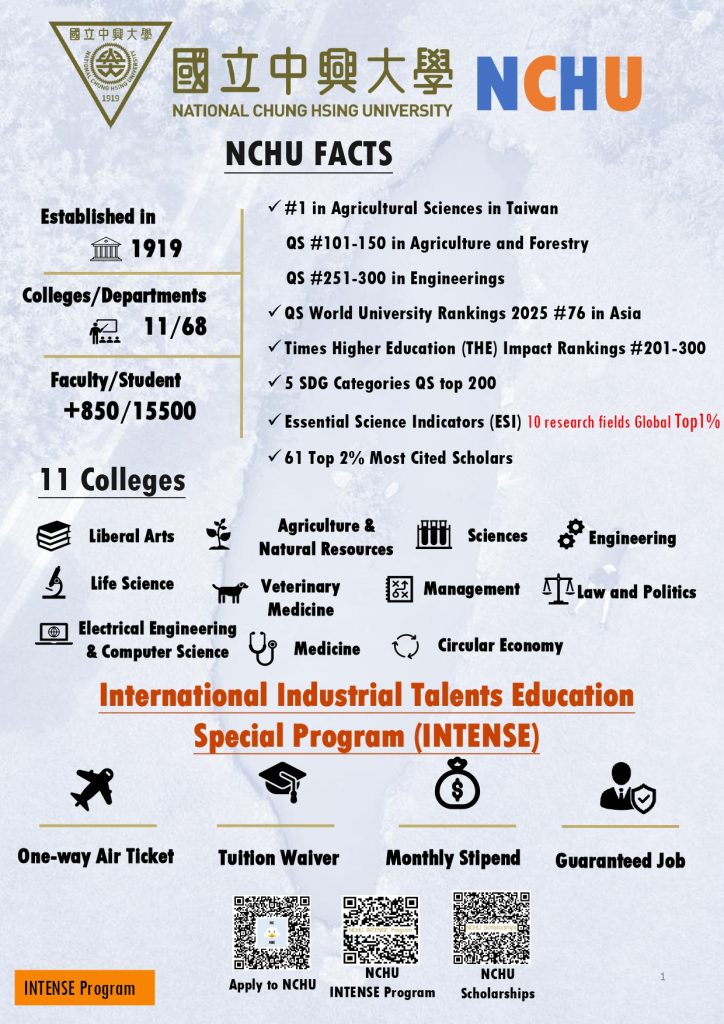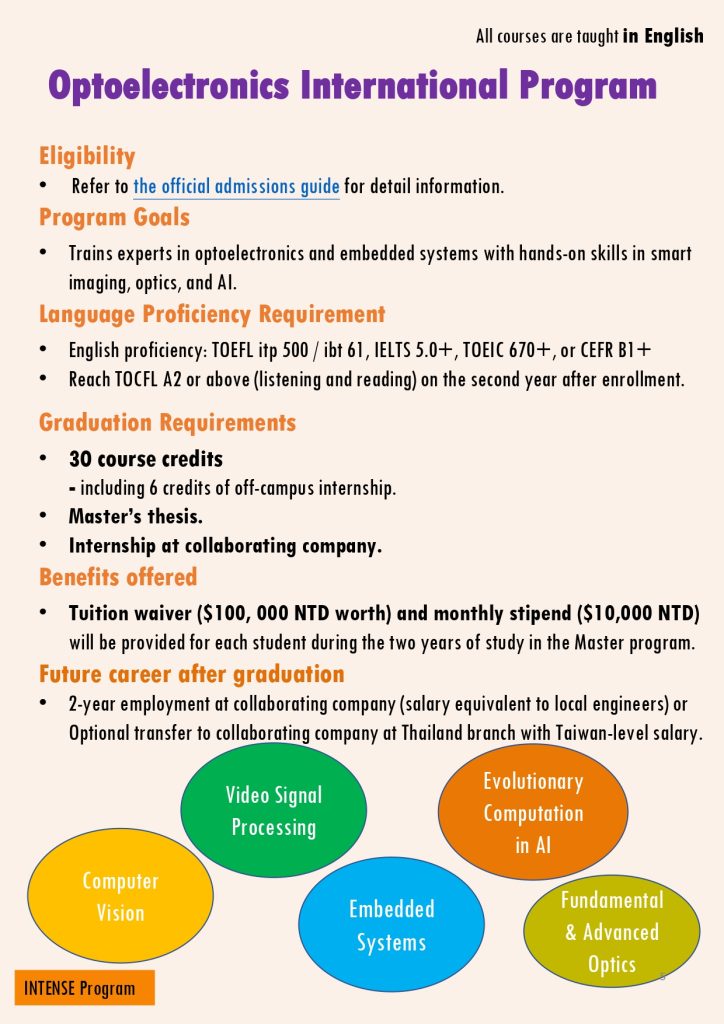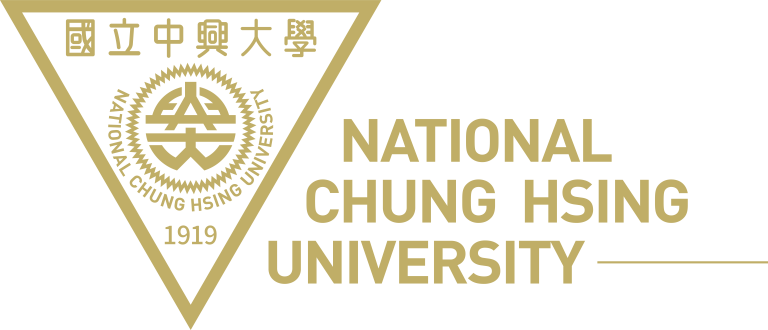INTENSE: Optoelectronics International Program
系所名稱 Name of Department | 電機工程學系 Department of Electrical Engineering |
專班名稱 Program Name | 電機工程學系 光學電子專班 Optoelectronics International Program |
學制 Degree | 碩士/專班 |
招生國籍及名額 Nationality & Admission Quota
| 泰國/印度 |
授課語言 | 全英語授課 |
共通語言能力門檻
| 英文語言能力 (至少需提供以下一檢測證明) |
口/面試 | 是 YES |
院系所提供獎學金 | 無 None |
系所簡介 | 本系為一活力充沛、發展潛力雄厚的新科系,擁有來自世界各地名校的優秀博士所組成的堅強師資陣容,以及首屈一指的電機大樓。在此優良的環境下,期以教學與研究並進的方式,帶領學生同登學術的殿堂。本系學制包含學士班、碩士班、博士班、碩士在職專班、產業碩士專班。隨著電機資訊產業的蓬勃發展,本系在持續網羅各界優良師資及優秀青年學子的加入下,教學研究將更加活躍,並以成為國際頂尖之電機系為目標。 教育目標 專業視野:經由通訊、資訊、系統與控制、固態電子與光電及電子電路五大學程,培育專業之電機工程人才。 理論與實務:培育學生紮實的理論基礎與實作能力 。 思考與創新:培育學生獨立思考與創新能力 。 合作與倫理:培養學生具溝通、協調及整合能力,並理解工程倫理 。 國際觀:培養學生國際觀並提升外語能力 。
Department of Electrical Engineering While the history of National Chung Hsing University can be traced back to 1919, the Department of Electrical Engineering (EE) is a relatively young department established in 1992. With consistent endeavor in pursuing excellence in both education and research, our department has now been recognized as the best EE department in central Taiwan. The current research areas of our department include communication and information, systems and control, system-on-chip (Soc), Opto-electronics, and several emerging interdisciplinary research. Reputed for the world-class faculty and vigorous research environment, our department attracts many top students for its bachelor’s, master’s, and doctoral programs every year. Students are expected to receive a comprehensive education that includes both fundamental principles and practical skills that are essential for them to succeed in the fast-growing high-tech world.
Education Characteristics
Solidity:Presently the department is divided into four teaching and research groups, Communication/Information, System and Control, Electronics, and System-on-Chip groups. Each group promotes relative professional knowledge and variant training courses which conform to the needs of the times. Profession:The faculties of the department have experience in the domestic/foreign academic and industrial worlds, so they can provide professional curriculum for variant fields. Practice:In order to serve the demands of Central Taiwan industry, we establish a close channel on the cooperation projects with industries and provide to cooperate researching and teaching with related organizations. Creativity:We encourage students to join the faculty’s research program and to make theoretical and practical works cooperate well. Service:To cultivate the talented person for the industrial circles urgent needs of professionals, we assist to hold various spreading education of short-term training programs on the fields of Electrical, Information, Electronic, and so on. |
課程設計 | 課程包括電腦視覺、視訊訊號處理、演化式計算Z、嵌入式系統原理與應用、光學相關課程、碩士論文、企業實習以及符合電子光學專班開設之各專業選修課程 The program includes courses such as Computer Vision, Video Signal Processing, Evolutionary Computation, Principles and Applications of Embedded Systems, Optics-related Courses, Master’s Thesis, Corporate Internship, and various elective courses offered by the Optoelectronics Program. |
畢業應修學分數及條件(依學位授予法及學校學則相關規範辦理) Graduation Requirement (In accordance with University Act, Degree Conferral Act and other applicable regulations) | 1. 畢業學分數:共30學分,含必修24學分(電腦視覺3學分、視訊訊號處理3學分、演化式計算Z 3學分、嵌入式系統原理與應用3學分、現代光學概論3學分、進階光學與系統3學分企業實習6學分)、選修0學分,碩士論文6學分。 2.畢業論文(專題)方式: 學生修滿所需畢業學分數後,才可進行碩士論文審查,碩士論文審查包括碩士論文書面審查及口頭報告口試 1. Graduation Credits: A total of 30 credits, including 24 required credits (Computer Vision (3 credits), Video Signal Processing (3 credits), Evolutionary Computation (3 credits), Principles and Applications of Embedded Systems (3 credits), Introduction to Modern Optics (3 credits), Advanced Optics and Systems (3 credits), Corporate Internship (6 credits)), 0 elective credits, and 6 credits for the Master’s Thesis. 2. Graduation Thesis (Project): Students must complete the required credits for graduation before proceeding with the master’s thesis review. The master’s thesis review consists of a written evaluation and an oral defense. |
畢業生未來發展 | 學生畢業後須留臺發展就業。 Students should stay in Taiwan for employment after graduation. |
網址 Website | https://www.ee.nchu.edu.tw/en_index.asp |
聯絡窗口 Contact | Title:特聘教授 Distinguished Professor Name & email:裴靜偉老師 zingway@dragon.nchu.edu.tw TEL : +886-4-22840688-801 |
其他說明 Additional notes | 合作企業Participating companies 合盈光電科技股份有限公司 H.P.B. Optoelectronics 合作企業提供國際專班學生於專班就學期間生活津貼每人每月新台幣10,000,但延修期間除外。 The participating companies will provide a monthly stipend ($10,000 NTD) for each admitted student during the two years of study in the Master program. |




